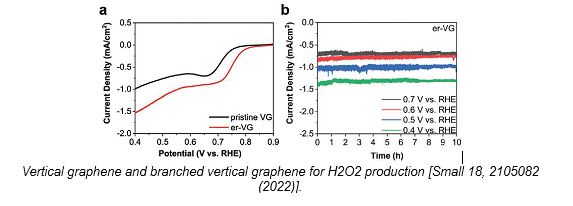Project summary
Hydrogen peroxide (H2O2) is one of the most important and versatile chemicals with widespread applications in many industrial fields. H2O2 is currently produced through the multistep anthraquinone oxidation process, which is energy intensive and environmentally unfriendly. This project will explore graphene-based materials, including vertical graphene and N-doped graphene, as the metal-free electrodes for electrochemical H2O2 production. A key challenge in developing metal-free electrodes is that they often suffer from low Faradaic efficiency and stability when producing H2O2 at high current densities. The project will aim to overcome this challenge via structural and surface engineering of graphene-based materials using plasma and/or chemical methods. Flow cell assembly and operation will also be explored to produce H2O2 in a continuous high throughput manner, which will be potential for practical applications.
The project will include the following activities:
- Prepare graphene-based electrodes with tunable surface wettability, functional groups, and dopants.
- Evaluate electrochemical H2O2 production using the graphene-based electrodes in flow cell configuration.
- Investigate the active sites and three-phase interfacial engineering for enhanced H2O2 production at high current densities and mass transfer rate.
Academic Supervisor:
